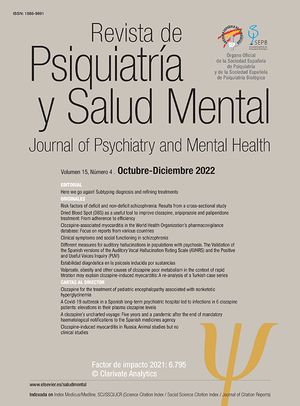Everybody has a right to the maximum attainable standard of mental health. This includes the right to available, accessible, acceptable, and good quality care, and the right to liberty, independence and inclusion in the community (WHO, 2023). 1
Protecting all human rights of people with mental health conditions is indisputable essential to achieve a high-quality mental health care. Fraguas et al (2014) 2 review the measures and actions related to protect human rights and the degree of implementation of these measures in the different mental health plans or strategies at national (Spain) and regional level. Humanized care is a key dimension in all care strategies, although most of the mental health plans in Spain do not comprise actions directly focused on human rights. Several actions for improvement in this way are proposed: establishing quality controls and measurable and objective indicators related to human rights; using satisfaction and perceived quality questionnaires for professionals, individuals with mental illness and relatives.
Nowadays, many people who need mental health care do not receive them, in part because of workforce shortages. There is an increasing mismatch between mental health care access and demand. Epidemiological and economic burden of mental disorders remains increasing, 16% of global DALYs could be attributable to mental disorders in 2019 that represents a more than three-fold increase compared to conventional estimates. 3
Garcia-Pacheco et al (2024)4 reveal that the disease burden of mental, neurological, substance use, suicide and associated somatic conditions represented up to 16% of DALYs with respect to the total number of diseases and causes of death in Mexico from 1990 to 2019. The impact of sex, age, state, and degree of marginalization on disease burden is analyzed. In the same line of thoughts, Mar and cols. (2024). 5 in a retrospective design exploring all the individuals of the Basque Country aged between 1 to 30 years, reported that the highest prevalence of mental disorders was observed in males with low socioeconomic status. Moreover, the lower income categories had higher risks of psychiatric admission and death. Also, Gonzalez-Domenech and cols. (2024) 6 describe the high prevalence of social anxiety disorder in general population in Andalusia, with younger age, social adversity and the presence of high levels of paranoia increased as risk factors of suffering it. Thus, increasing equity in access to mental health care is a critical first step in improving service quality. Maximizing patient outcomes will entail reaching out to as many individuals as possible earlier in their illness trajectory, helping them recognize mental health needs, and making them co-leaders in their care. 7
Early detecting and treatment intervention in both specialty care and primary care settings will be essential for alleviating symptoms associated with anxiety and depression. Current challenges facing mental health care needs should develop and integrate a collaborative care model that incorporates complementary and alternative assessment and treatment approaches focused on the potential of mental health and artificial intelligence in primary care settings. Anmella and cols. (2024) 8 have developed a comprehensive machine learning digital support platform (PRESTO) to cost-effectively screen, assess, triage, and provide personalized treatments for anxious and depressive symptoms in primary care. They propose the use of a digital decision support platform combining machine learning models with a smartphone-based app for monitoring and delivering evidence- based psychological interventions for people with mild to moderate anxious and depressive symptoms will reduce waiting times and improve the quality of mental healthcare in a cost-effective manner.
Moreover, improving standardized approaches for diagnosing and assessing symptoms 9,10 and also for evaluating crucial determinants of mental illness is a priority for boosting quality of care for mental disorders. 11
The defense and fulfillment of human rights involves improving equity and accessibility to quality assistance and services that must be designed according to the specific needs of the population.
Conflicts of InterestIn the last three years Benedicto Crespo-Facorro has been a consultant to or has received honoraria or grants from Angelini, Boehringer, Rovi, Janssen, Lundbeck and Otsuka.







